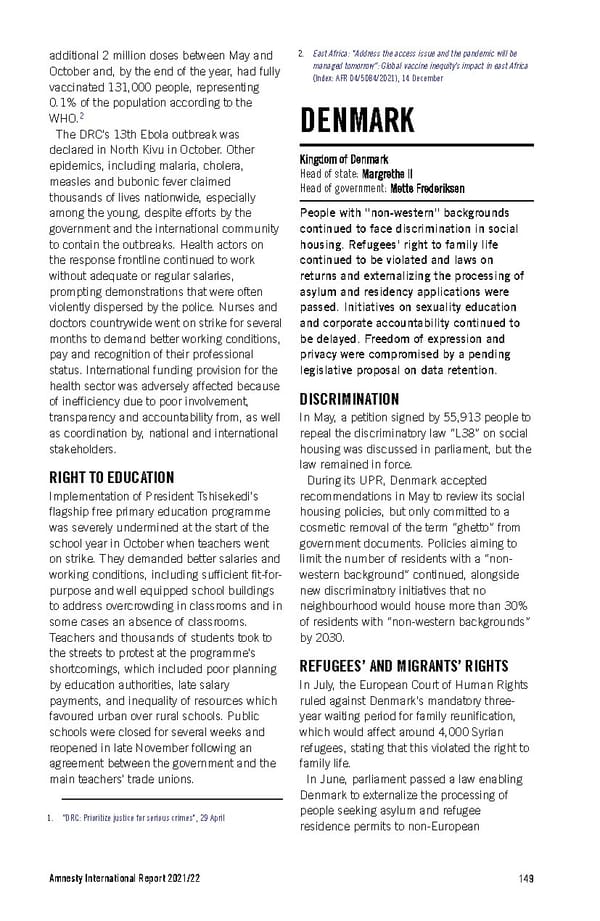additional 2 million doses between May and 2. East Africa: “Address the access issue and the pandemic will be October and, by the end of the year, had fully managed tomorrow”: Global vaccine inequity’s impact in east Africa vaccinated 131,000 people, representing (Index: AFR 04/5084/2021), 14 December 0.1% of the population according to the WHO.2 DENMARK The DRC’s 13th Ebola outbreak was declared in North Kivu in October. Other Kingdom of Denmark epidemics, including malaria, cholera, Head of state: Margrethe II measles and bubonic fever claimed Head of government: Mette Frederiksen thousands of lives nationwide, especially among the young, despite efforts by the People with “non-western” backgrounds government and the international community continued to face discrimination in social to contain the outbreaks. Health actors on housing. Refugees’ right to family life the response frontline continued to work continued to be violated and laws on without adequate or regular salaries, returns and externalizing the processing of prompting demonstrations that were often asylum and residency applications were violently dispersed by the police. Nurses and passed. Initiatives on sexuality education doctors countrywide went on strike for several and corporate accountability continued to months to demand better working conditions, be delayed. Freedom of expression and pay and recognition of their professional privacy were compromised by a pending status. International funding provision for the legislative proposal on data retention. health sector was adversely affected because DISCRIMINATION of inefficiency due to poor involvement, transparency and accountability from, as well In May, a petition signed by 55,913 people to as coordination by, national and international repeal the discriminatory law “L38” on social stakeholders. housing was discussed in parliament, but the RIGHT TO EDUCATION law remained in force. During its UPR, Denmark accepted Implementation of President Tshisekedi's recommendations in May to review its social flagship free primary education programme housing policies, but only committed to a was severely undermined at the start of the cosmetic removal of the term “ghetto” from school year in October when teachers went government documents. Policies aiming to on strike. They demanded better salaries and limit the number of residents with a “non- working conditions, including sufficient fit-for- western background” continued, alongside purpose and well equipped school buildings new discriminatory initiatives that no to address overcrowding in classrooms and in neighbourhood would house more than 30% some cases an absence of classrooms. of residents with “non-western backgrounds” Teachers and thousands of students took to by 2030. the streets to protest at the programme’s shortcomings, which included poor planning REFUGEES’ AND MIGRANTS’ RIGHTS by education authorities, late salary In July, the European Court of Human Rights payments, and inequality of resources which ruled against Denmark’s mandatory three- favoured urban over rural schools. Public year waiting period for family reunification, schools were closed for several weeks and which would affect around 4,000 Syrian reopened in late November following an refugees, stating that this violated the right to agreement between the government and the family life. main teachers’ trade unions. In June, parliament passed a law enabling Denmark to externalize the processing of 1. “DRC: Prioritize justice for serious crimes”, 29 April people seeking asylum and refugee residence permits to non-European Amnesty International Report 2021/22 149
 Amnesty International Report 2021/22 Page 148 Page 150
Amnesty International Report 2021/22 Page 148 Page 150